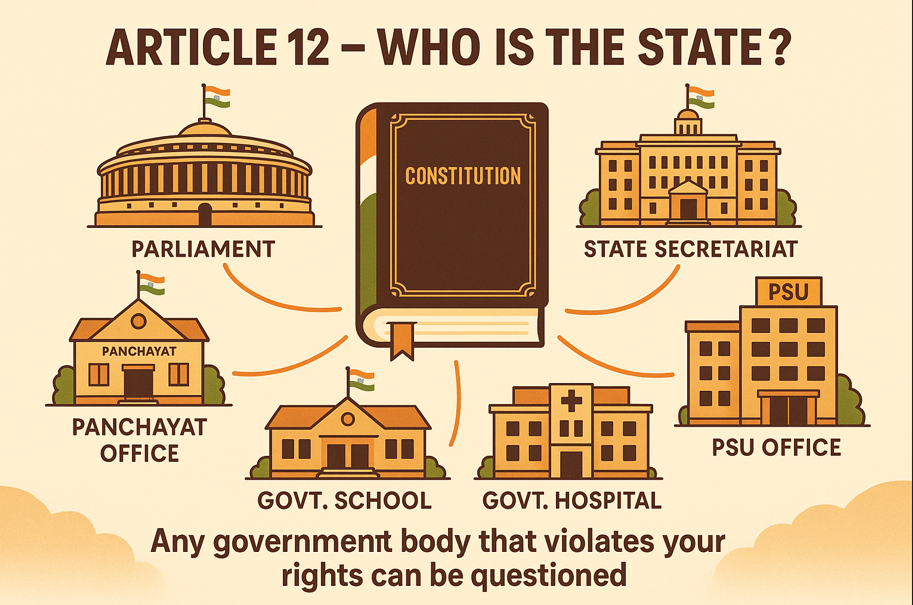Article 12 – Who Is "The State" in the Eyes of the Constitution?

Why It Matters:
Whenever we say “Fundamental Rights protect us from the State”, it raises one important question:
❓ “Who exactly is the ‘State’?”
Is it just the government? What about government schools, banks, or public companies?
That’s where Article 12 comes in.
What Article 12 Says (In Simple Words):
"The term ‘State’ includes the Government and Parliament of India, the Government and Legislatures of each of the States, and all local or other authorities within the territory of India or under the control of the Government of India."
Break It Down: Who is Included in 'The State'?
-
Central Government 🏛️
– PMO, Union Ministries, Parliament, Central Government Departments -
State Governments 🏢
– CM Offices, State Assemblies, State Government Departments -
Local Authorities 🏙️
– Municipal Corporations, Panchayats, Nagar Palikas -
Other Authorities ⚖️
– Any authority that works under or is controlled by the government
– Includes Public Sector Units (PSUs), LIC, ONGC, AIIMS, Government Schools, Nationalized Banks, etc.
Why Is This Important?
Because your Fundamental Rights (like right to equality, right to freedom, etc.) are protected against actions by the State.
So, if any of these authorities discriminate, violate your privacy, or deny services unfairly, you can take legal action.
Real-Life Examples:
-
A government school refuses admission to a Dalit child.
👉 It’s a violation by the State under Article 15 (equality). You can go to court. -
A public hospital denies emergency treatment because the patient is poor.
👉 This can be challenged as a violation of Right to Life (Article 21). -
A PSU doesn’t allow women to apply for certain jobs.
👉 That’s discrimination. Since it’s a ‘State’, you can use your Right to Equality.
Judgments That Defined 'State' Further:
-
Rajasthan Electricity Board Case (1967):
The Supreme Court said even autonomous bodies under government control are considered 'State'. -
Ajay Hasia Case (1981):
If a body is financially, administratively, and functionally under government control, it is ‘State’.
What You Can Do As a Citizen:
-
Know your rights against government bodies
-
If a public institution violates your rights, raise a complaint
-
File an RTI to get information about discriminatory practices
-
Use Article 32 or Article 226 to approach the Supreme Court or High Court
Article 12 tells you who is responsible for protecting your rights. And if anyone under “State” violates them – you have the power to act.
- Goa
- Jammu & Kashmir
- Punjab
- Uttar Pradesh
- Uttarkhand
- Andaman & Nikobar Islands
- Andhra Pradesh
- Karnataka
- Kerala
- Lakshdweep
- Puducherry
- Tamilnadu
- Telangana
- Dadra &Nager Haveli, Daman &Diu
- Himachal Pradesh
- Gujarat
- Madhya Pradesh
- Maharashtra
- Rajasthan
- Legal
- Life Style
- Music
- Prop News
- Sports
- Technology
- SURAKSHA
- Education
- International
- Haryana
- BMA
- Bharat
- Business
- Entertainment
- Fashion & Beauty
- Health & Fitness
- Arunachal Pradesh
- Assam
- Bihar
- Chattisgarh
- Jharkhand
- Ladakh
- Manipur
- Meghalaya
- Mizoram
- Nagaland
- Odisha
- Sikkim
- Tripura
- West Bengal
- Chandigarh
- Delhi - NCR
- Bharat Aawaz
- IINNSIDE
- Business EDGE
- Media Academy



